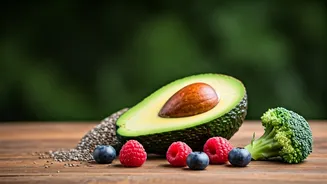Fiber's Crucial Role
Fiber, an indigestible component of plant-based foods, is a cornerstone of gut health. Its importance lies in its ability to support the growth of beneficial
gut bacteria, often referred to as probiotics. These probiotics are essential for several bodily functions, including nutrient absorption, immune system regulation, and inflammation reduction. Insufficient fiber intake can starve these vital bacteria, leading to gut dysbiosis, a condition marked by an imbalance in the gut microbiome. This imbalance can manifest in various digestive issues such as bloating, constipation, and an increased risk of chronic diseases. Ensuring a diet rich in fiber-packed foods is, therefore, crucial for maintaining a healthy and functional digestive system and, consequently, overall health.
Avocados: A Powerhouse
Avocados, celebrated for their creamy texture and distinctive flavor, are a nutritional powerhouse, particularly beneficial for gut health. They boast a substantial amount of dietary fiber, contributing significantly to daily fiber needs. Moreover, avocados are rich in healthy fats, which aid in nutrient absorption. These fats support a robust gut lining, ensuring efficient absorption of vital nutrients and acting as a protective barrier against harmful substances. Incorporating avocados into meals, whether in salads, smoothies, or as a spread, can be a delicious and effective method of boosting both fiber intake and overall gut health. Their versatility makes them a simple yet potent addition to any balanced diet.
Berries: Bursting Benefits
Berries, including blueberries, raspberries, and strawberries, are a delightful source of both soluble and insoluble fiber, making them excellent for gut health. Soluble fiber dissolves in water, forming a gel-like substance that slows digestion, helps regulate blood sugar, and feeds beneficial gut bacteria. Insoluble fiber adds bulk to the stool, promoting regular bowel movements and preventing constipation. Berries are also packed with antioxidants, which combat oxidative stress and protect against cell damage in the gut. Consuming a variety of berries offers a wide range of benefits, supporting gut function and contributing to overall wellness. Enjoying berries as part of your daily diet is a tasty way to enhance gut health and fortify your body.
Legumes: Fiber Champions
Legumes, such as beans, lentils, and chickpeas, stand out as excellent sources of fiber and protein, vital for gut health. They supply a rich blend of both soluble and insoluble fiber types, catering to different digestive needs. These fiber-rich legumes also act as prebiotics, nourishing the beneficial bacteria in the gut and promoting their growth. A diet high in legumes can improve bowel regularity, lower cholesterol levels, and reduce the risk of chronic diseases. Incorporating legumes into meals is simple and can be done in many ways, like adding them to soups, salads, or side dishes. The versatility and nutritional value of legumes make them an invaluable addition to a gut-friendly diet.
Chia Seeds: Tiny Wonders
Chia seeds, small in size but mighty in nutritional value, are remarkable for their fiber content and their positive effects on gut health. When exposed to water, chia seeds absorb liquid and expand, forming a gel-like substance that aids digestion and promotes a feeling of fullness. This helps regulate appetite and supports weight management. Chia seeds also contain both soluble and insoluble fiber, benefiting gut health by improving bowel movements and fostering a healthy gut microbiome. Adding chia seeds to your diet is easy; they can be sprinkled on cereal, added to smoothies, or used as a thickening agent in sauces. Their versatility and health benefits make chia seeds an excellent addition to a gut-friendly lifestyle.
Whole Grains: Fiber Sources
Whole grains, such as oats, brown rice, and quinoa, are integral to a healthy diet, particularly for gut health, due to their rich fiber content. Unlike refined grains, whole grains retain their bran, germ, and endosperm, thus preserving their fiber and nutrient richness. Fiber in whole grains helps regulate bowel movements and feeds beneficial gut bacteria. Consuming whole grains has also been associated with reduced risks of heart disease, type 2 diabetes, and certain cancers. Making a conscious effort to include whole grains in your diet can be straightforward. Opt for whole-grain bread, brown rice, or quinoa over their refined counterparts. They can also be a key component in a balanced diet, helping to enhance gut health and support overall well-being.












